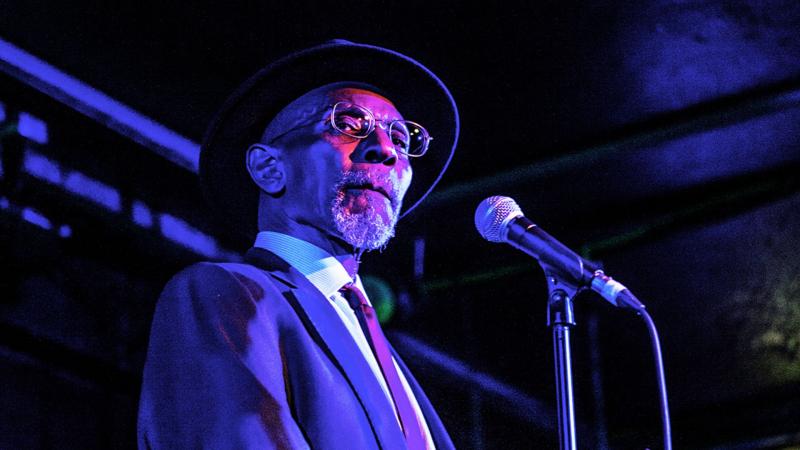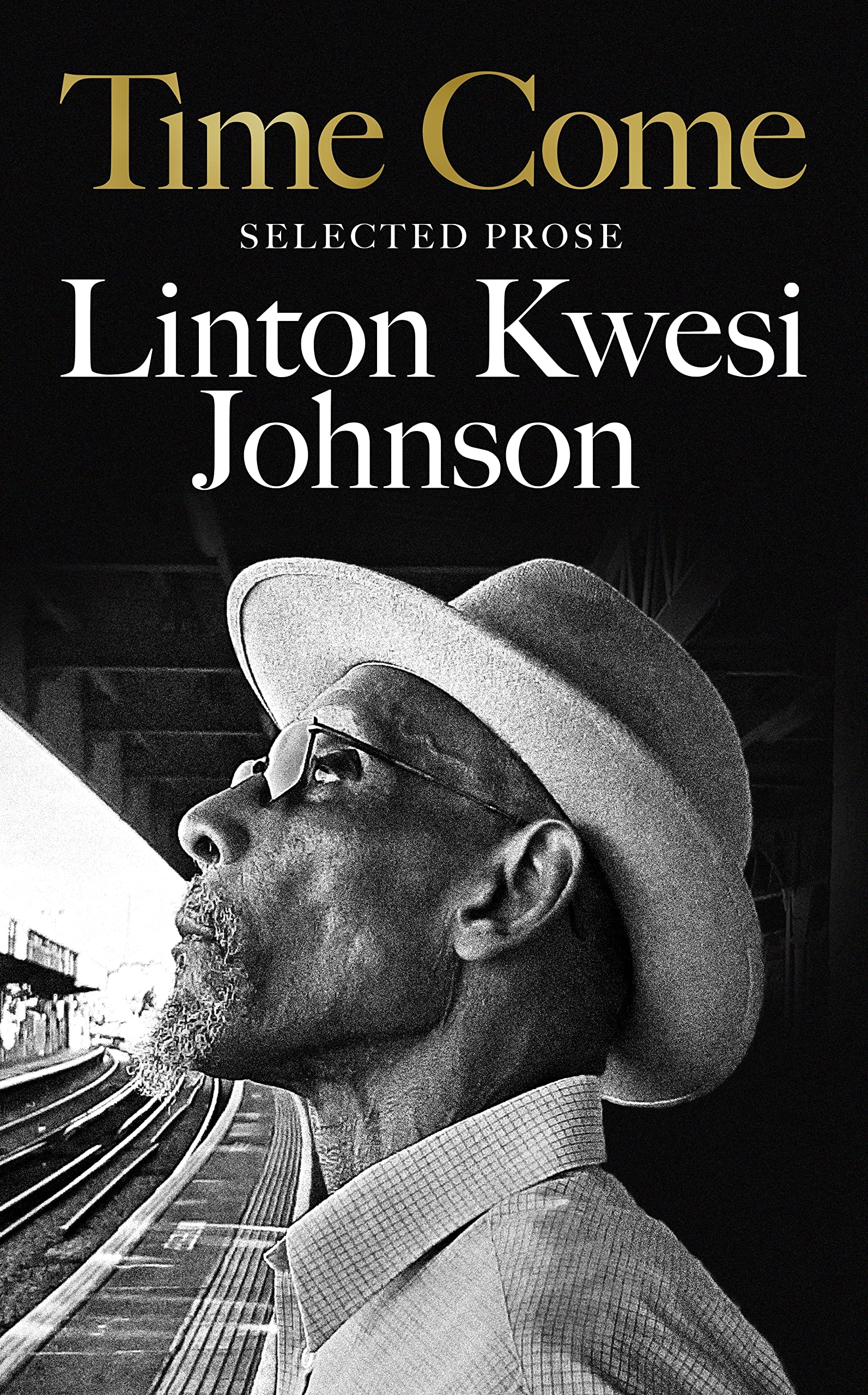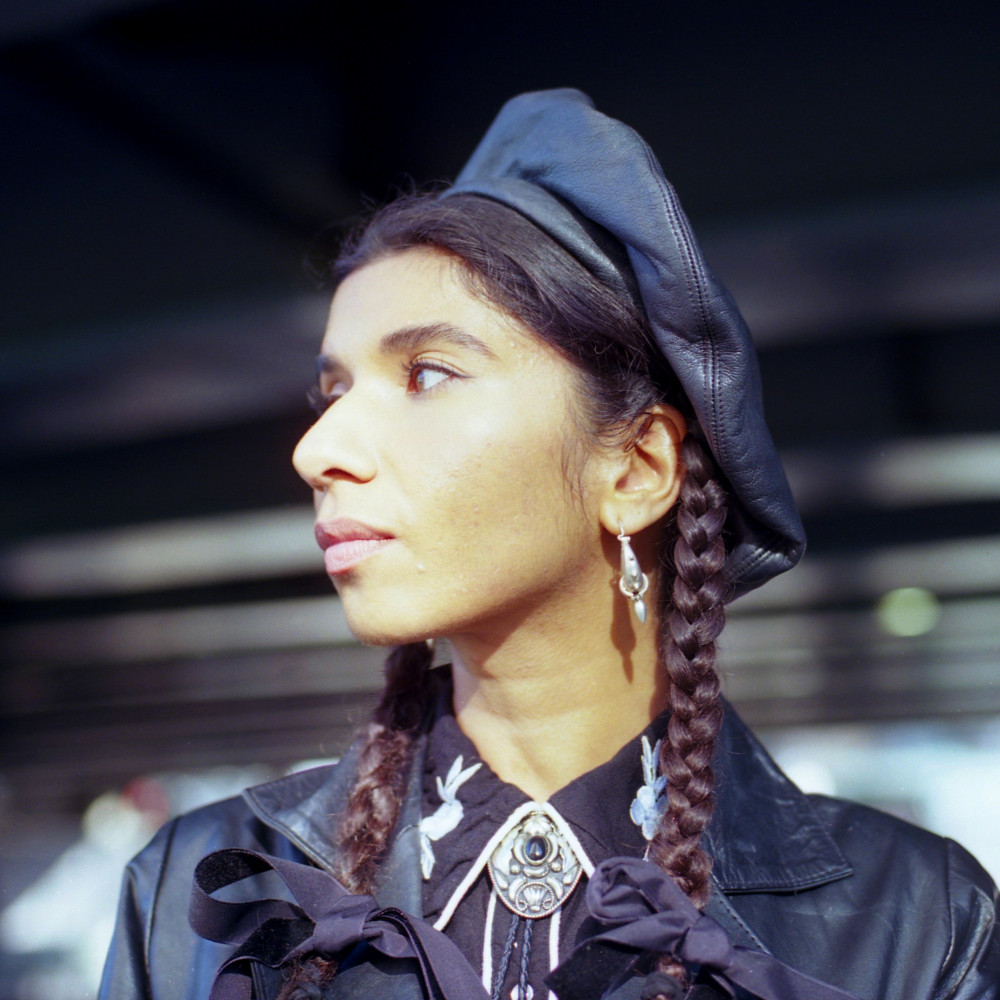Glory to Sound: Linton Kwesi Johnson, Brighton Festival 2023 review - a reggae rebel's life in music | reviews, news & interviews
Glory to Sound: Linton Kwesi Johnson, Brighton Festival 2023 review - a reggae rebel's life in music
Glory to Sound: Linton Kwesi Johnson, Brighton Festival 2023 review - a reggae rebel's life in music
England's premier dub poet reflects on Marley, grime and fighting to win

Straight-backed at 70, Linton Kwesi Johnson wears the smart garb of a British Caribbean elder – trilby, cream jacket, West Indies maroon jumper and tie, grey trousers, blue socks and grey shoes. His voice has resonant, slow-rolling authority befitting Britain’s pioneer, premier dub poet. He folds his legs, but raises a lecturing finger. Though relatively relaxed and ready to laugh, he shows, in attitude as much as posture, a stern, iron backbone.
Marking his prose collection Time Come’s publication, LKJ has sold out the grand Theatre Royal for this talk and selection of laptop-played tracks with Brighton Festival guest director Nabihah Iqbal. Iqbal is an empathetic and quick-witted compere, half Johnson’s age but bridging any generational divide, and quietly drawing on her own experience as a British Pakistani musician, writer, artist and activist growing up after Johnson’s embattled black Britons.
 “Soon I’ll be 70,” Johnson recalls thinking, explaining Time Come’s genesis. “Next thing you know I’ll be dead.” So he pondered a posthumous selection of record and film reviews, essays and profiles written between his art. “My wife said, ‘Don’t be an idiot. The time is now…’”
“Soon I’ll be 70,” Johnson recalls thinking, explaining Time Come’s genesis. “Next thing you know I’ll be dead.” So he pondered a posthumous selection of record and film reviews, essays and profiles written between his art. “My wife said, ‘Don’t be an idiot. The time is now…’”
His account of his early life is educative, changed by Brixton Library, New Beacon Books and conversations in its founder John La Rose’s Finsbury Park front room, the Black Panthers and the collection Black Poetry. WEB Du Bois’ The Souls of Black Folk (1903) “awakened something in me”. The Sixties civil rights and anti-colonial struggles forged him in their “cooling embers”.
“Jamaican folk culture” was his “bedrock”, though, in his first 11 years with “peasant” parents before moving to England in 1962. The King James Bible was his first lexicon alongside his grandmother’s folk songs, spirituals and riddles, told on rustic “moonlit nights”.
Britain was a “racially hostile…rude awakening”, Jamaican music’s “lyricism” a crucial comfort. Prince Buster’s “talking tunes” hit first, and Johnson selects “Ten Commandments” - “Very chauvinistic, but let’s hear it” – and “Judge Dread”, a laptop and the theatre’s sound-system doing neither any favours. By the Seventies, he was a “reggae purist”, “serious, serious student” and lone dissenter at Bob Marley’s rise above the other Wailers. “You’ve taken the mixed-race one and made [him] a star” and “dreadlocked exotic”, he thought and wrote, which sounds more heretical now. As for Island marketing Marley as “king of rock?” “What the hell? I was disgusted.” Marley later met him and talked deeply.
 Poetry, politics and music was interwoven. Johnson became a reggae star on Island himself, with his dub poetry accompanied by Dennis Bovell. “License Fi Kill” (1998) is the only track he lets run nearly to the end, as it names the black dead in Met Police custody and blames the law’s limp guardians, as a harmonica wails. A rare recent poem written in lockdown portrays “a magical day of exuberant light” in Brockwell Park during 2020’s eerily blissful spring, shadowed by ambulance cries.
Poetry, politics and music was interwoven. Johnson became a reggae star on Island himself, with his dub poetry accompanied by Dennis Bovell. “License Fi Kill” (1998) is the only track he lets run nearly to the end, as it names the black dead in Met Police custody and blames the law’s limp guardians, as a harmonica wails. A rare recent poem written in lockdown portrays “a magical day of exuberant light” in Brockwell Park during 2020’s eerily blissful spring, shadowed by ambulance cries.
During audience questions, the notion that he’s “the godfather of UK hip-hop” has him looking dismissively over his shoulder, the idea of recommending new grime artists absurd. “I’m an old man now!” he snorts, suggesting Miles Davis’s Kind of Blue. He talks knowledgably, anyway, of hip-hop and British-African grime’s Jamaican roots, and won’t let Iqbal’s suggestion of grime and reggae’s similar “ethos” pass, noting the latter’s spiritual and African, Rastafari consciousness.
Asked for the difference between black British experience in his youth and now, he acknowledges today’s subtler, ongoing struggle. Still, his generation was “outside British society”. Through “self-organisation, riots and insurrections”, they moved inside. “We fought. And we won.”
rating
Explore topics
Share this article
Add comment
The future of Arts Journalism
You can stop theartsdesk.com closing!
We urgently need financing to survive. Our fundraising drive has thus far raised £49,000 but we need to reach £100,000 or we will be forced to close. Please contribute here: https://gofund.me/c3f6033d
And if you can forward this information to anyone who might assist, we’d be grateful.

Subscribe to theartsdesk.com
Thank you for continuing to read our work on theartsdesk.com. For unlimited access to every article in its entirety, including our archive of more than 15,000 pieces, we're asking for £5 per month or £40 per year. We feel it's a very good deal, and hope you do too.
To take a subscription now simply click here.
And if you're looking for that extra gift for a friend or family member, why not treat them to a theartsdesk.com gift subscription?
more Books
 'We are bowled over!' Thank you for your messages of love and support
Much-appreciated words of commendation from readers and the cultural community
'We are bowled over!' Thank you for your messages of love and support
Much-appreciated words of commendation from readers and the cultural community
 Tom Raworth: Cancer review - truthfulness
A 'lost' book reconfirms Raworth’s legacy as one of the great lyric poets
Tom Raworth: Cancer review - truthfulness
A 'lost' book reconfirms Raworth’s legacy as one of the great lyric poets
 Ian Leslie: John and Paul - A Love Story in Songs review - help!
Ian Leslie loses himself in amateur psychology, and fatally misreads The Beatles
Ian Leslie: John and Paul - A Love Story in Songs review - help!
Ian Leslie loses himself in amateur psychology, and fatally misreads The Beatles
 Samuel Arbesman: The Magic of Code review - the spark ages
A wide-eyed take on our digital world can’t quite dispel the dangers
Samuel Arbesman: The Magic of Code review - the spark ages
A wide-eyed take on our digital world can’t quite dispel the dangers
 Zsuzsanna Gahse: Mountainish review - seeking refuge
Notes on danger and dialogue in the shadow of the Swiss Alps
Zsuzsanna Gahse: Mountainish review - seeking refuge
Notes on danger and dialogue in the shadow of the Swiss Alps
 Patrick McGilligan: Woody Allen - A Travesty of a Mockery of a Sham review - New York stories
Fair-minded Woody Allen biography covers all bases
Patrick McGilligan: Woody Allen - A Travesty of a Mockery of a Sham review - New York stories
Fair-minded Woody Allen biography covers all bases
 Howard Amos: Russia Starts Here review - East meets West, via the Pskov region
A journalist looks beyond borders in this searching account of the Russian mind
Howard Amos: Russia Starts Here review - East meets West, via the Pskov region
A journalist looks beyond borders in this searching account of the Russian mind
 Henry Gee: The Decline and Fall of the Human Empire - Why Our Species is on the Edge of Extinction review - survival instincts
A science writer looks to the stars for a way to dodge our impending doom
Henry Gee: The Decline and Fall of the Human Empire - Why Our Species is on the Edge of Extinction review - survival instincts
A science writer looks to the stars for a way to dodge our impending doom
 Jonathan Buckley: One Boat review - a shore thing
Buckley’s 13th novel is a powerful reflection on intimacy and grief
Jonathan Buckley: One Boat review - a shore thing
Buckley’s 13th novel is a powerful reflection on intimacy and grief
 Help to give theartsdesk a future!
Support our GoFundMe appeal
Help to give theartsdesk a future!
Support our GoFundMe appeal
 Jessica Duchen: Myra Hess - National Treasure review - well-told life of a pioneering musician
Biography of the groundbreaking British pianist who was a hero of the Blitz
Jessica Duchen: Myra Hess - National Treasure review - well-told life of a pioneering musician
Biography of the groundbreaking British pianist who was a hero of the Blitz
 Shon Faye: Love in Exile review - the greatest feeling
Love comes under the microscope in this heartfelt analysis of the personal and political
Shon Faye: Love in Exile review - the greatest feeling
Love comes under the microscope in this heartfelt analysis of the personal and political

Comments
The performance was a